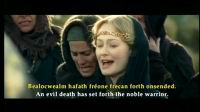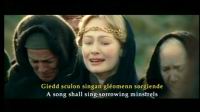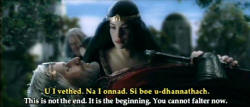18. Foundations of Stone: The Fight Q.
19. Foundations of Stone: The Abyss Kh.
20. The King of the Golden Hall: The Fallen
21. Éowyn's Dirge O.E.
22. Evenstar S
23. Treebreard: Entmoot S.
24. The White Rider: The King O.E.
25. Helm's Deep: The Missing O.E.
26. Helm's Deep: The Call O.E.
28. Forth Eorlingas: Mearas O.E.
29. Isengard Unleashed: The Ents S.
30. Isengard Unleashed: Haldir's Lament Q
18. The Fight: featured in Foundations of Stone
Words by Philippa Boyens, translated into Quenya by David Salo, music by Howard Shore.
Version published on the Internet Limited Edition website for the Two Towers Soundtrack.
Quenya
Cuiva Olórin
Nárendur
[3.34]
Tira nottolya
Tulta tuolya
An mauya mahtie
[3.37]
Ter oiomornie
Ter ondicilyar.
Mettanna.
[2.32] [3.32]
Nurunna!
'Awake Olórin
Servant of fire
Face your foe
Summon forth your strength
For you must fight
Through endless dark
Through chasms of stone.
To the end.
To the death!'
Word-for-word translation:
'Awake Olórin
Fire-servant
Look-at foe-your
Summon strength-your
For [you] compel to-fight
Through ever-darkness
Through stone-chasms.
End-towards.
Death-towards!
∙ Khuzdûl ∙
(Gandalf’s fight with the Balrog): featured in Foundations of Stone
Words by Philippa Boyens, translated into Khuzdul by David Salo, music by Howard Shore.
Version published on the Internet Limited Edition website for the Two Towers Soundtrack.
Khuzdul
Irkat-lukhud ma
[2.44]
katabrikihu
Ulfat-atam ma
tanakhi uduhu
[3.08]
bin-nât aznân tarsisi
Bazar udu agânî-furkhîn
Gurd!
Ma nîd sakhu!
Ma satf unkhai!
Atkât zatagrafizu
Zatablugi sulluzu
'No shaft of light
Can breach it
No breath of air
Comes from it
Only an endless dark rises
Deep from the beginnings
Of the world.
Have fear.
Do not look down
Nor step too close
The silence will take you.
It will swallow you whole.'
∙ Old English (Rohirric) ∙
20. The Fallen (Theoden Grives for his Son)
featured in The King of the Golden Hall
Words by Philipa Boyens, translated into Old English (Rohirric) by David Salo, music by Howard Shore.
Version
published on the Internet Limited Edition website for the Two Towers
Soundtrack.
Old English (Rohirric)
Hé laered hine rídan
And wealdan méce
And standan fæst
And féond ne forhtian.
Nú hé sceal leornian
Ðæt hearde sóð:
Hé raerede his cnapa
Of cilde tó menn
[3.01]
Ðæt hé his déað geséo.
[3.14]
Sé féond wæs simble mid
heom.
Sé féond ne reccede ege.
'He taught him to ride,
To wield a sword.
To stand strong
And
show his enemy no fear.
Now he must learn
The hard truth:
That he had brought his boy
From childhood.
So that he might face his death
Like a man.
The enemy was always with them.
The enemy did not care about fear.'
∙ Old English (Rohirric) ∙
featured on the TTT Extended Edition DVD
Words by Philipa Boyens, translated into Old English (Rohirric) by David Salo, music by Howard Shore.
The first line is very similar to the fragment of Beowulf: (line 2265): Bealocwelm hafað fela feorhcynna forð onsended... 'Baleful death has many of my living kin sent forth...' (thanks to Pernilla Jansson from Sweden). The reconstruction of the final part (not translated in the DVD comments) is by Maria Artamonova (a graduate student of Old English at Oxford and a member of the Oxford Tolkien Society).
Old English (Rohirric)
![]() Sound file
[854 KB]
Sound file
[854 KB]
Bealocwealm
hafað
fréone frecan forth onsended
giedd
sculon singan gléomenn sorgiende
on Meduselde þæt he ma no wære
his dryhtne dyrest and mæga deorost.
Bealo...
'An
evil death has set forth
the noble warrior
A song shall sing sorrowing minstrels
in Meduseld that he is no more,
to his
lord dearest and kinsmen most belover.
'An
evil death...'
∙ Sindarin ∙
Text by J.R.R. Tolkien, translated into Sindarin by David Salo. It is performed by Isabel Bayrakdarian. The same words can be found in the dialogs. See here.
I.
Solo in Sindarin
Ú i vethed nâ i onnad. [0.00]
Si boe ú-dhanna.
Ae ú-esteli, esteliach nad.
Chorus in Sindarin (simultaneous with above)
Ú i vethed nâ i onnad. [0.00]
Chorus in Sindarin (alone)
Nâ boe ú i. [0.48]
II.
Solo in Sindarin
Estelio han, estelio han, estelio, [1.58]
estelio han, estelio veleth.
Chorus in Sindarin (simultaneous with above)
[Es]teliach nad, estelio han. [1.58]
I.
'Not the end [it] is the beginning.
Now it-is-necessary [that] don't-fall
If you don't-trust some-thing.'
'Not the end [it] is the beginning.'
'[It] is necessary don't that.'
II.
'Trust this, trust this, trust
Trust this, trust love.'
You trust some-thing, trust this.'
ú adv. 'not'.
i article 'the'.
vethed n. 'end'; lenited form of methed 'end' (UT 452).
nâ v. pres. '[it] is'; cf. no 'be!' (VT#44, 21) from *na- 'to be'.
onnad n. & gerund 'beginning'; cf. *onna- 'to beget'.
si adv. 'now'.
boe v. pres. impersonal 'it is necessary (to), one needs (to)': David Salo's reconstruction based on the Noldorin bui (see Etymologies and Elfling message).
ú-dhanna v. fut. 'it falls'; lenited form of danna; cf. danna- 'to fall' (LR 354).
ae
conj.
'if'; reconstructed after Q
ai-quen 'if anybody, whoever'
(WJ:372).
esteliach v. pres 'you trust'; a reconstructed verb *estelia- 'to trust'; cf. estel 'hope, trust'.
estelio v. imper. 'trust'; see above.
han pron. 'it'.
nad n. 'thing; *something'.
veleth n. 'love'; lenited form of meleth 'love'.
teliach v. 'you play'; cf. telia- 'play' (LR 395). Its presence here is obscure.
∙ Sindarin ∙
23. Entmoot: featured in Treebeard
Words by Philippa Boyens, translated into Sindarin by David Salo, music by Howard Shore.
Version published on the Internet Limited Edition website for the Two Towers Soundtrack.
Sindarin
Naur vi
eryn,
lanc i dalaf.
Mathach vi geven?
Nostach vi 'wilith?
Mâb le i nagor,
Bâd gurth vi ngalad firiel.
Dorthach vi mar han?
Dagrathach go hain?
'The woods are burning,
the ground lies bare.
Do you feel it in the earth?
Can you smell it in the air?
The war is upon you,
Death moves in the fading light.
Are you part of this world?
Will you join their fight?'
Word-for-word translation:
'Fire in forest,
naked [is] the ground.
Feel-you [it] in earth?
Smell-you [it] in air?
Takes you [or you are taken by] the war,
Goes death in light fading.
Dwell-you in land this?
Will-make-war-you with them?'
naur n. 'fire'.
vi prep. 'in' (VT#44, p. 21).
eryn n. 'wood'.
lanc n. 'naked' (UT 418).
i definite article 'the'.
dalaf n. 'ground, floor'; lenited form of talaf 'ground, floor' (LR 390).
mathach v. pres. 'you feel'; cf. matha- 'feel, stroke, handle' (LR 371) + -ch '2nd sg. you'.
geven n. 'earth'; lenited form of ceven 'earth' (VT#44, p. 21).
nostach v. pres. 'you smell [it]'; *nosta- 'smell'; cf. stem NUS-; Q nusta- 'smell' + -ch '2nd sg. you'.
'wilith n. 'air'; lenited form of gwilith 'air as a region'.
mâb v. pres. '[it] *takes'; *mab- 'seize, take away by force, *take'; MAP- 'grasp' (LR 371).
le pron. 'you'.
nagor n. 'battle, *war'; lenited form of dagor 'battle' (LR 375).
bâd v. pres. '[it] goes'; bad- 'go'.
gurth n. 'death'.
ngalad n. 'light'; lenited form of galad 'radiance, glittering, *light' (LR 375).
firiel n. part. 'fading'; cf. *fir- 'fade, die'.
dorthach v. pres. 'you dwell'; cf. dortha- 'dwell, stay' (LR 376) + -ch '2nd sg. you'.
mar n. 'land'; lenited form of bar 'dwelling, home; inhabited land'.
han n. 'this'; lenited form of *san 'this'.
dagrathach v. fut. 'you will battle'; cf. dagra- 'battle' (LR 375) + -ch '2nd sg. you'.
go prep. 'together [with]'; cf. go- 'together' (LR 399, WJ 367).
hain pron. 'they; them'; pl. of ha 'it'.
24. The King
(Theoden is Transformed by Gandalf):
featured in The White Rider
Words by Philipa Boyens, translated into Old English (Rohirric) by David Salo, music by Howard Shore.
Version
published on the Internet Limited Edition website for the Two Towers
Soundtrack.
Lim-strang wæs geboren
[0.12]
Bearn léod-cyninga
[0.24]
Magorinc Mearces.
[0.37]
Bunden in byrde tó laedenne
Bunden in lufe tó ðegnunge
Lang beadugear cýðað
Lic onginneð búgan.
Swift déadlic géar Stieppað geond willan.
Ac éagan gíet lóciað Beorhtre gesihðe;
Heorte gíet béateð.
'Strong-limbed he was born
This son of Kings;
This warrior of Rohan.
Bound by birth to lead.
Bound by love to serve.
Long years of war begin to show.
The body has begun to bend.
Swift mortal years outpace the will.
But the eyes still watch clear-sighted.
The great heart is beating still.'
25. The Missing: featured in Helm's Deep
Words by Philippa Boyens, translated into Old English (Rohirric) by David Salo, music by Howard Shore.
Version published in the CD booklet..
Old English (Rohirric)
Héo naefre wacode dægréd
Tó bisig mid dægeweorcum
Ac oft héo wacode sunnanwanung
Ðonne nihtciele créap geond móras
And on ðaere hwile
Héo dréag ðá losinga [3.26]
Earla ðinga ðe héo forléas. [3.35]
Héo swá oft dréag hire sáwle sincende
Héo ne cúðe hire heortan lust.
'She never watched the morning rising,
Too busy with the day's first chores,
But oft she would watch the sun's fading,
As the cold of night crept across the moors.
And in that moment
She felt the loss
Of everything that had been missed.
So used to feeling the spirit sink,
She had not felt her own heart's wish.'
26. The Call (Theoden Dresses For Battle):
featured in Helm's Deep, The Hornburg and Forth Eorlingas
Words by J.R.R. Tolkien, translated into Old English (Rohirric) by David Salo, music by Howard Shore.
Version published on the Internet Limited Edition website for the Two Towers Soundtrack.
Old English (Rohirric)
Hwær cwóm helm? Hwaer cwóm
byrne?
HD
[0.56] H [0.45]
FE
[passim]
Hwær cwóm feax flówende?
HD
[1.06] H [1.14]
FE
[passim]
Hwær cwóm hand on hearpestrenge?
HD
[1.17]
Hwær cwóm scir fýr scinende?
HD
[1-29]
Hwær cwóm lencten and hærfest?
Hwær cwóm héah corn weaxende?
FE
[passim]
Hwá gegaderath wuduréc of
wealdholte byrnende?
Oððe gesiehth of gársecge
ðá géar gewendende?
'Where is the helm and the hauberk,
and the bright hair flowing?
Where is the hand on the harp string,
and the red fire glowing?
Where is the spring and the harvest
and the tall corn growing?
Who shall gather the smoke of
the dead wood burning?
Or behold the flowing years
from the Sea returning?'
Note:
Regarding this lyric our friend, Marilynn Miller, wrote:
The information I found at Musicnotes.com regarding this sheet music did not agree with your information, so I bought the sheet music. At the beginning of this track, the sheet music contains these lyrics:
Hwær cwóm helm Hwær
cwóm byr
Hwær cwóm feax flówende
Hwær cwóm helm Hwær cwóm byr
Hwær cwóm feax flówende
Hwær cwóm hand on
hearpestrenge
Hwær cwóm scínende
Hwær cwóm hand on hearpestrenge
Hwær cwóm scínende
This entire phrase gets repeated 3 times and goes from [0.00 - 0:57] (Actually instead of the word ‘scíende’, it is once ‘soínende’ and once ‘sonende’. If these aren’t legitimate words in OE then I would assume that they are misspellings) As I said, they are sung in triplets. There are 4 beats per bar, at a speed of about a beat per second. If you 1-2-3 for every beat you get triplets.
There is a syllable for every count of the triplet making the phrasing thus:
Hwær - cwóm -
helm Hwær - cwóm - byr
Hwær - cwóm - feax flów - en - de
Hwær - cwóm -
hand on - hearp - e
strenge - Hwær - cwóm scí - nen - de
Tul cui
ta ya tu
o ol
ya ló
an rin
mau ya
hwær cwóm
helm hwær
cwóm byr
ne hwær
cwóm scir
fyyr
The
last half is
Where is the helm? Where is the hauberk?
Where is the red fire? (Do I have this right?)
∙ Sindarin ∙
27. The Mearas: featured in Forth Eorlingas and The White Rider
Text based on the poem The Mearas by Philippa Boyens, translated into Old English (Rohirric) by David Salo, music by Howard Shore.
Version published only in sheet music.
Solo in Old English (Rohirric)
for ðon hé wæs
scea hé fæx wæs ford ealra mé du
and hé fæx hlá
[2.14]
Chorus in
Old English (Rohirric)
(simultaneous with above):
for
ðon
hé waes Sceadufæx
FE [2.14],
WR [1:15-2:00]
hláford ealra méara
'For he was Shadow...., he, ...fax, was ...lord of all hor..., ...dow..., and he, ...fax, lord...'
'For
he was Shadowfax,
Lord of all Horses.'
It is a fragment of The Mearas by Philippa Boyens:
'In the distance they saw
him,
White sun caught in his mane.
Logn they called him,
But he would not come.
for he was Shadowfax,
Lord of all Horses.
And he answered only to one.'
∙ Sindarin ∙
28. Aragorn: featured in Breath of Life
This Sindarin text is by Fran Walsh. It is performed by Sheila Chandra.
Solo [by Sheila Chandra] in Sindarin
Uich gwennen na 'wanath ah na dhín. [0.11]
An uich gwennen na ringyrn ambar hen.
Boe naid bain gwannathar,
Boe cuil ban firitha.
Boe naer gwannathach, [...] [1.33]
'You are not bound to loss and silence.
For you are not bound to the circles of this world.
All things must pass away,
All life is doomed to fade…
Sorrowing you must go, [and yet you are not without hope].'
uich 'you are not'; according to David Salo: *ugikk(é) > *u3ich > uich 'you are not'.
gwennen pp. '[is] bound, obliged'; cf. *gwedh- 'bind' (LR 397).
na prep. 'to, towards; with, by'.
'wanath n. 'death; *loss'; lenited form of gwanath 'death (act of dying, not death as a state or abstract) (LR 395).
ah conj. 'and; with'.
dhín n. 'silence'; lenited form of dín 'silence' (S 430).
an prep. 'to, towards; for'. Its usage here is strange.
ringyrn n. 'circles'; pl. of ringorn 'circle' (LR 365).
ambar n. 'world' (LR 372).
hen adj. 'this'; lenited form of sen 'this'.
boe v. pres. impersonal 'it is necessary (to), one needs (to)': David Salo's reconstruction based on the Noldorin bui (see Etymologies and Elfling message).
naid n. 'things'; pl. of nad 'thing' (LR 374).
bain adj. 'all; pl. of ban 'all, in totally', which is lenited form of pan.
naid n. 'things'; pl. of nad 'thing' (LR 374).
gwannathar v. fut. '[they] will pass away'; cf. gwanna- 'depart, die' (LR 397).
cuil n. 'life' (LR 366).
ban adj. 'all; lenited form of pan 'all, in totally'.
firitha v. fut. '[it] will fade, die'; cf. *fir- 'fade, die'.
naer adj. 'sad, lamentable' (LR 375).
gwannathach v. fut. 'you will pass away'; cf. gwanna- 'depart, die' (LR 397).
29. The Ents: featured in Isengard Unleashed
Words by Philippa Boyens, translated into Sindarin by David Salo, music by Howard Shore.
Version published in the CD booklet and in the sheet music.
Chorus in Sindarin
rithannen i geven [2.18]
thangen i harn
na fennas i daur
ôl dûr ristannen
eryn...
Solo [Ben del Maestro] in Sindarin
...echuiannen [2.58]
i ngelaidh dagrar
ristar thynd, cúa tawar
dambedir enyd i ganed
si linna i 'waew trin 'ylf
Isto i dur i chuiyl
i ngelaidh dagrar
'Earth shakes
Stone breaks
The forest [is] at [your] door
The dark sleep is broken
The woods...
... have awoken
The trees have gone to war
Roots rend, wood bends
The Ents have answered the call
Through branches now the wind sings
Feel the power of living things
The trees have gone to war'
Word-for-word translation:
'Shaken the earth
broken the stone
at door the forest
sleep dark broken
woods awoken
the trees make-war
rend roots, bends wood
answered Ents the call
now sings the wind through-the branches
have-knowledge [of] the strength of-the living-creatures
the trees make-war'
rithannen v. pp. 'shaken'; cf. ritha- 'jerk, twitch, snatch' (LR 384).
i definite article 'the'.
geven n. 'earth'; lenited form of ceven 'earth' (VT#44, p. 21).
thangen v. pp. 'broken'; cf. *thag- 'press, *break stone(s)'.
harn n. 'stone'; lenited form of sarn 'stone'.
na prep. 'with, by'.
fennas n. 'doorway, gateway'.
daur n. 'forest'; lenited form of taur 'forest'.
ôl n. 'dream'.
dûr adj. 'dark, sombre' [shouldn't it rather be *dhûr? Adjectives usually mutate after their nouns. R.D.]
ristannen v. pp. 'cut'; cf. rista- 'to cut' (LR 384).
eryn n. pl. 'wood, *woods'.
echuiannen v. pp. 'awoken'; cf. *echuia- 'awake'.
ngelaidh n. pl. 'trees'; lenited form of gelaidh, pl. of galadh 'tree'.
dagrar v. pres. pl. '[they] go to war'; cf. dagra- 'to battle' (LR 375).
ristar v. pres. pl. '[they] cut; [they] rend'; cf. rista- 'to cut' (LR 384).
thynd n. pl. 'roots'; pl. of thond 'root'.
cúa v. pres. 'bend'; *cúa- 'to bend', KU3- 'bow' (LR 365).
tawar n. 'great wood, forest'.
dambedir v. pres. pl. '[they] answer'; *dambed- 'to answer': dan 'against, back' + ped- 'say'.
enyd n. pl. 'ents'; pl. of onod 'ent'.
ganed n. 'call'; lenited form of *caned 'call' (cf. can- 'to cry out, shout, call' - PM 361-2).
linna v. pres. 'sings'; cf. linna- 'to sing'.
'waew n. 'wind'; lenited form of gwaew 'wind'.
trin n. 'through the'; cf. trî 'through' + in 'the' (pl.).
'ylf n. 'branches'; lenited form of *gylf, pl. of golf 'branch' (LR 359).
isto v. imper. 'know'; cf. ista- 'to have knowledge' (LR 361).
dur n. 'power'; lenited form of *tur 'power, strength'.
chuiyl n. pl. 'living things'; lenited form of *cuiyl, pl. of *cuiul 'living creature': cui(n) 'living' + ul(unn) 'monster'.
30. Haldir's Lament: featured in Isengard Unleashed
This verse is a fragment of the Galadriel's Lament (The Fellowship of the Ring book). This Quenya text is by J.R.R. Tolkien. For its analysis see J.R.R. Tolkien The Road Goes Ever On. It is performed by Elizabeth Fraser.
Solo [by Elisabeth Fraser] in Quenya
Ar sindarnóriello mornie caita,
Ar ilye tier unduláve lumbule...
'And grey-country-from lies darkness,
And all roads down-licked [the] clouds...'


